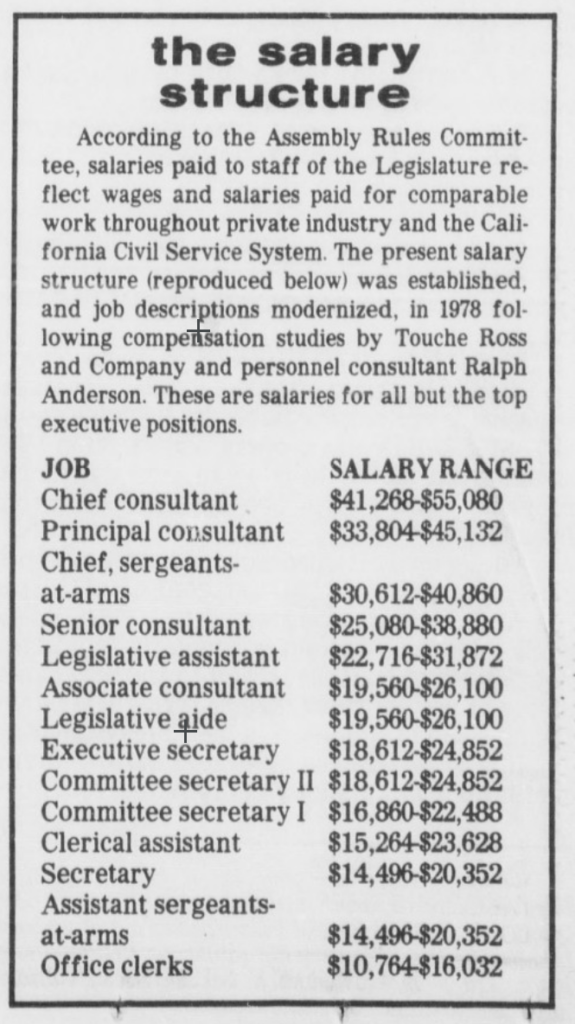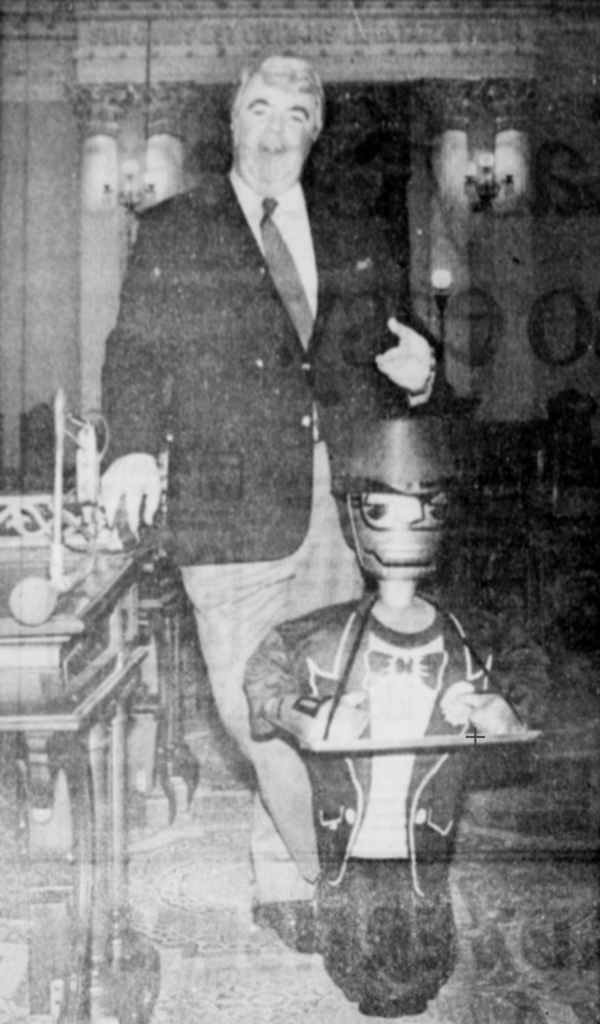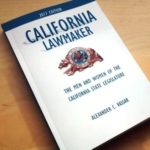1849 (December 17) – Two days after the legislature meets for the first time, the houses elect their first staffers. The first staffer hired by the Assembly is Principal Clerk E. H. Tharp and the first hired by the Senate is Secretary of the Senate J. F. Howe. Tharp resigned after 67 days.
1870 (early April) – During drinks at the Golden Eagle Hotel Saloon during the final week of session, an Assembly staffer made a comment that Assemblyman Michael Hayes “resented.” It escalated to the point that Assemblyman Charles H. McMillen drew a knife, and the Barkeeper was cut while trying to disarm him.
1893 – W. C. Beal (“Assembly attache and a gentleman of color”) becomes the earliest known Black legislative staffer.
(Sacramento Daily Union 23 February 1893, p. 3)
1913 – The Office of Legislative Counsel was established to assist the Legislature, the Governor, and other state officers by providing nonpartisan legal services relating to the legislative process.
1917 (January) – As of the start of the regular session, the pay for Assembly staff was:
Asst Clerks: $7/day
Engrossing and Enrolling Clerk: $7/day
Chief Stenographer: $6/day
Stenographers: $5/day
Asst Journal Clerk: $5/day
Asst Engrossing and Enrolling Clerk: $5/day
Asst Sergeants-at-arms: $5/day
Postmistress: $4/day
Committee Clerk: $4/day
Source: “Attaches at the Assembly Now” San Luis Obispo Daily Telegram, Number 272, 15 January 1917, p.6
1921 (January 3) – Hattie Jewell Anderson of Oakland was elected Assembly Minute Clerk. The motion to elect her was made by Assemblywoman Elizabeth Hughes and seconded by Assemblywoman Esto Broughton. Anderson is the first woman to be elected an officer of the State Assembly.
“INFLUENCE OF WOMEN FELT” Sacramento Daily Union, Volume 218, Number 4, 4 January 1921
1941 (June 9) – The Legislative Analyst’s Office (LAO) was created to provide analysis and nonpartisan advice and recommendations to the California Legislature on fiscal and policy issues. Slightly over decade later, in July 1951, the Joint Legislative Budget Committee and LAO were formally established in code.
1942 – While investigating the activities of German citizen Hans Wilhelm Rohl relating to his potential involvement in espionage against the U.S. military in the years leading up to WWII, legislative committee investigator Willard Bruce Pine was attacked in San Francisco and had to be hospitalized.
1954 (July) – Assemblyman Edwin S. Bulen was accused of hiring a secretary for his office (with the requirement that she pay part of her salary to his wife) State Controller Robert Kirkwood announced that he would be placing a hold on payments to legislator relatives working for the legislature. In late July, the Legislative Counsel determined that it was illegal for legislators to hire a “dependent relative” and on July 29th, the legislature began the process of removing legislative spouses and family members as staffers.
1958 – The Ford Foundation established its Legislative Internship Program (later to become the Assembly Fellows program) with five interns placed in the Chief Clerk’s Office. One of the five, Jim Driscoll, would be elected Chief Clerk in 1963 and serve until 1986.
1961 – Following the election of Jesse Unruh as Assembly Speaker, the Assembly began to build a staff to analyze bills and issues. In 1961, there were approximately 500-600 legislative staff.
1963 (July 30-31) – In one of the more pivotal moments in California political history, Assembly Speaker Jesse Unruh divides his attention between passing the state budget and going on a date with a young Assembly staffer that he met that morning. Helen Jones, recently married to a baseball player, had recently been hired as a secretary for Assemblyman Richard J. Donovan. While delivering papers to the Assembly Desk, Unruh saw her and asked her to dinner “just to welcome [her] aboard as an Assembly employee.” She hesitantly agreed to meet him for dinner at the El Mirador.
During the day’s session, Republicans caucused and decided to vote as a bloc (in spite of individuals having promised Unruh that they would vote for the budget). In a mix that Jones attributed to diet pills and heavy drinking, Unruh refused to allow the Assembly to adjourn and forced the house to remain in session overnight (with National Guard cots brought onto the floor for members to sleep on). While the Republicans were locked in, and had to have their dinners brought to them on the Floor, Unruh left the ongoing session to have dinner with Jones.
The following evening, Jones and Unruh had dinner at the Sacramento Inn with Assemblymembers Zenovich and Waldie. Although they had a relationship that lasted for several years (and included him buying her a convertible), she described her later relationship with Unruh as a reflection of that night; “I think I was a good memory and a bad memory for Jess. Whenever he saw me after that, he thought of that night.”
Based on interviews with Helen Jones (in 2020) and Assemblymen James R. Mills (in 2016) and Bill Bagley (in 2021).
1966 (November 8) – With 73.5% of voters approving, Proposition 1A amended the state constitution changing to create a full-time Legislature. Previously, the legislature only met for regular sessions lasting a few months (frequently lasting one month in even-numbered years and three to five months in odd-numbered years).
1973 (August) – The legislature was cited as employing 1,500 professional staff (with 800 working in the Capitol). A study by Assemblyman Walter Karabian found that women held 19 out of 163 committee consultant positions in the Assembly and 5 out of 89 in the Senate. “In the Assembly, the usual staff allocation for each member is two secretaries in the Capitol and one administrative assistant in the district office. In the Senate, each member is entitled to at least two secretaries and an administrative assistant (AA) in the Capitol.”
Source: “Solons Not Living Up To Sex Discrimination Ban” by GERI SHERWOOD Desert Sun, 23 August 1973
1976 – The Senate Fellows Program began with an initial class of six fellows, all placed in legislative committees. The following class (1977-78) included the first Senate Fellows assigned to the offices of individual legislators.
1977 (January 15) – Robert Mark Lewis, a Special Assistant to State Senator Alex P. Garcia, was assassinated by members of the Mexican Mafia. He was shot to death in a car in the Echo Park area of Los Angeles. In April 1984, Anthony Delia Jr. admitted in court that he was involved in the murder of Lewis.
1977 – State Senator Ralph Dills authored the State Employer-Employee Relations Act of 1978 (commonly known as the “Dills Act”) which allows collective-bargaining for public employee unions. Legislative staff were specifically excluded from either forming a union or participating in collective bargaining.
1983 – The legislature employed 2,200 staff.

1984 (June 5) – Voters approved Proposition 24 by 53.1% which, among various impacts, would have required a reduction in funding for the legislature in 1984-85 by 30% and limited future growth in legislative funding. In May 1986, a three-judge panel of the 3rd District Court of Appeal ruled most of Proposition 24 unconstitutional.
1985 (January) – Following the passage of Proposition 24, forcing a reduction in expenditures on legislative staff, Senator Bill Campbell “hired” the first robotic legislative staffer, a battery-powered robot named Solon. Solon, who appeared with Senator Campbell on the Senate Floor carrying a tray, Campbell joked that the robot “will function as well as some of the other members of the staff.”
1990 (November 6) – Voters approve Proposition 140 by 52.2%. The proposition not only imposed California’s first term limits but also dramatically limited spending on legislative staff. “In the fiscal year immediately following the adoption of this Act, the total aggregate expenditures of the Legislature… [may not exceed] 80 percent of the amount of money expended for those purposes in the preceding fiscal year…”
1992 (May 4) – The Senate first adopted the “Standards of Conduct of the Senate” which included that “no officer or employee of the Senate may be intimidated, coerced, or compelled, as a condition of continued appointment or employment, to either volunteer time or contribute money to a candidate or campaign.”
2009 (February 18-20) – In response to Senate Republicans refusing to approve the state budget, Senate President pro Tem Darrell Steinberg refused to allow the Senate to adjourn, holding it in session for 45.5 hours. During the breaks while Senator were in caucus on “day that wouldn’t end,” staff slept under desks in Capitol offices and many “borrowed” bathrooms from coworkers who lived nearby in order to take showers.
Source: I was there.
2015 (August) – According to the data in the legislature payroll reports, almost one third of Assembly staff have worked there for less than a year and nearly 60% of Assembly staff have worked there for 3 years or less.
2017 (February) – There were 1,193 Assembly employees listed in the salaries spreadsheet. The midpoint in Assembly tenure (currently 2 years, 5 months).
2019 (January 19) – Following a series of sexual harassment scandals at the Capitol which resulted in several legislators resigning in 2017 and 2018, the legislature established a Workplace Conduct Unit (WCU) as a division of the Office of Legislative Counsel, to investigate complaints of discrimination, harassment, and retaliation in the Legislature.
2022 (May 31) – As of the latest data released by the legislature, the Assembly had 1006 fulltime salaried employees, 60 employees working either hourly or on a reduced schedule, and 23 paid interns. The State Senate had 821 fulltime salaried employees, 15 employees paid hourly, and 16 paid interns.
Source: Assembly Payroll (May 2022) and Senate Payroll (August 2021)
2022 (August) – Assembly Bill 1577 by Assemblyman Mark Stone, which would have enacted the Legislature Employer-Employee Relations Act, is the closest that legislative staff have come to forming a union. If approved, this law would have provided employees of the legislature the right to form, join, and participate in union activities (including representation on all matters of employer-employee relations). The bill passed the Senate, and then failed on the final day of the 2021-2022 session in Assembly PERS Committee.
2023 (October 7) – AB 1 by Assemblymember Tina McKinnor, which like 2022’s AB 1577 would authorize legislative staff to unionize, has passed the State Senate 30-3 and the State Assembly 71-5. The bill, titled the Legislature Employer-Employee Relations Act (LEERA) would provide for resolving disputes about wages, hours, and other terms and conditions of employment, as well as providing for collective bargaining. It was signed by Governor Newsom and the law would go into effect on July 1, 2026.








